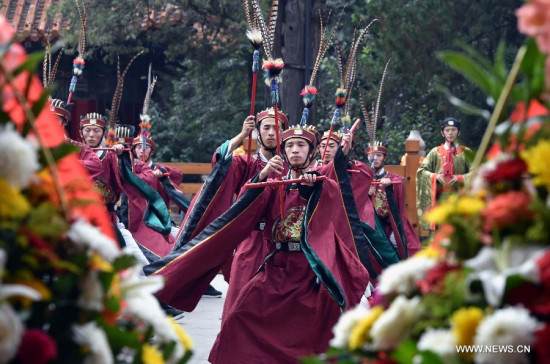
Participants wearing traditional costumes perform during a ritual to mark the 2,566th anniversary of Confucius' birthday at the Confucius Temple in Qufu, east China's Shandong Province, Sept. 28, 2015. The ritual worshipping Confucius was held at the Temple of Confucius in Qufu Monday, the birthplace of the ancient philosopher. (Xinhua/Zhu Zheng)
Monday's birthday celebration for Confucius is a prime event in the eastern Chinese city of Qufu, birthplace of the philosopher and cultural icon about 2,500 years ago.
Hundreds gathered at the Temple of Confucius, reciting his teachings and dancing in traditional scholars' robes in a ceremony said to date back to 478 BC.
However, Kong Xiangling, a 75th-generation descendant of "the Grand Master," did not break his daily routine for the event.
For Kong, a clergyman living in the municipal seat of Jining about 45 km from Qufu, Monday is his quiet time of religious learning without any major rituals to prepare for.
Bearing the family name of Confucius and being one of the sage's two million descendants, he does not feel obliged to follow the Confucian school nor that it is odd for him to choose Christianity.
"My parents were Christian and so was my grandfather. I don't know how my grandpa started but I grew up with the religion," he said.
One of his four siblings as well as his son and daughter-in-law are all practicing Protestants.
Being one of the earliest graduates of Shandong Theological Seminary, Kong became a minister in the early 1990s.
"This is the heartland of Confucianism but Christianity prospers. The church I serve is an example," he said.
Baptist missionaries established themselves in Jining in the 1910s and built Huangjiajie Church, where Kong preaches, in 1925. The church can now hold 1,500 people.
There are about 130,000 Protestants and 448 registered churches and practicing locations in Jining.
Catholics, Muslims, Buddhists and Taoists all have sizable numbers of followers, churches and temples in the municipal area of eight million residents, including 630,000 in Qufu.
Of course, different philosophical systems and religions don't always see eye to eye -- for instance, in ancestor worship, which is important in the Confucian tradition but discouraged by the Church.
Yang Ping'an, a 58-year-old Christian in Jining, did not set up a shrine for his late parents at home as many locals do, nor perform tomb-sweeping rituals such as kneeling in front of their graves and burning fake money as offerings.
"I offer flowers and bow at their tombs. Some of my close family members do not agree but they keep their opinion to themselves. Also, the country has been encouraging frugality in mourning the dead," he said.
Despite differences in formality, the essential parts of Confucianism and Christianity are not so distant.
"I am not very familiar with Confucian teachings but I know the basics. I do not find them exclusive," Kong said. "The essence of Confucianism, such as compassion, love of family and the idea of serving and helping other people, are the same as Christian teachings."
In a fast-changing country that faces big social challenges in its modernization process, religious practice focuses more on spreading constructive messages and promoting a positive lifestyle, according to the clergyman.
"Nurturing good hearts and guiding people to the right path, it plays the same role as rituals in traditional culture or modern promotional campaigns," he said.
There are more similarities between indigenous tradition and foreign religion. Both of them were sidelined for ideological reasons during radical eras in the past century but are now being incorporated back into the identity of a modern China.
Confucius and his teachings are gaining limelight. Last year, President Xi Jinping attended an international conference commemorating Confucius' birth at the Great Hall of the People in Beijing.
After taking the helm as Chinese leader, Xi has voiced his respect for Confucius and emphasized traditional culture's role in the country's cultural soft power on multiple occasions.
Prof. Zhang Yiwu, with Peking University, told Xinhua that promoting Chinese tradition should not be considered an aggressive move to fend off other cultures.
"Chinese civilization has always upheld the principle of harmony in diversity. I have no reason to believe it will stop now," he said, citing the example of Buddhism, which originated in India and became an indispensable part of Chinese culture.
The professor thinks modernizing China has greatly benefited from knowledge picked up from the West since the 19th century. "The world is diverse. We understand that and that's why the leadership is committed to opening up," he said.


















































